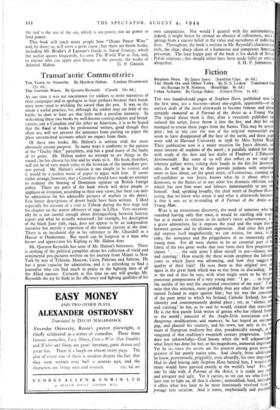Transat'antic Commentaries
The Curtain Rises. By Quentin Reynolds. (Cassell. 10s. 6d.) AT one time it was not uncommon for soldiers to write narratives of their campaigns and to apologise in their prefaces because their hands were more used to wielding the sword than the pen. It was on the whole a useful practice, for, although the soldier may see little of the battle, he does at least see that little with a peculiar intensity. In welcoming these two books by well-known correspondents and broad- casters, one a Canadian and the other an American, it is to be hoped that the flood of books by professional writers, good though they often are, will not prevent the amateurs from putting on paper the plain unvarnished accounts which we expect from them.
Of these two books, Mr. Halton's is written with, the more obviously serious purpose. In many ways it conforms to the pattern of the " Guilty Men " pamphlets, and has a good many of the faults of its genre. Mr. Halton makes no attempt to see things in the round ; he has chosen his line and he sticks to it. His book, therefore, will not be of very much value to the historian of the immediate pre- war period. Mr. Halton's solution is too simple to be correct and it would be a useless waste of paper to argue with him. It seems rather strange, however, that a Canadian should have made no attempt to evaluate the bearing of Dominion opinion on British foreign policy. There are parts of the book which will drive people to applause or irritation, according to their own views, but there can only be admiration for his admirable pictures of warfare in the desert. Few better descriptions of desert battle have been written. I liked especially his account of a visit to Tobruk during the first siege and his chapter on the winter offensive of 5941 in Libya. Very occasion- ally he is not careful enough about distinguishing between hearsay report and what he actually witnessed ; for example, his description of the black. June 13th, 1942, does not appear to be an independent narrative but merely a repetition of the rumour current at the time. There is an incidental slip in his reference to Mr. Churchill as a Hussar at Omdurman... But much can be forgiven to a man who knows and appreciates his Kipling-as Mr. Halton does.
Mr. Quentin Reynolds has none of Mr. Halton's bitterness. There is nothing of the political pamphlet about his collection of vivid and sentimental pen-pictures written on his journey from Miami to New York by way of Teheran, Moscow, Cairo, Palermo and Salerno. He has a great capacity for admiration, and it is refreshing to find a journalist who can find much to praise in the fighting men of all the Allied nations. Certainly at this time no one will grudge Mr. Reynolds the joy he finds in the efficiency and fighting qualities of his
own compatriots. Nor would I quarrel with his sentimentality, indeed, it might better be termed an absence of callousness, since it springs from a sincere belief in the value and sacredness of individual lives. Throughout, the book is written in Mr. Reynold's characteristic style, the clear, sharp idiom of a humorous and competent American pressman. The least happy part of the book is his sketch of Soviet. Polish relations ; this should either have been made fuller.pr omittsi


























 Previous page
Previous page